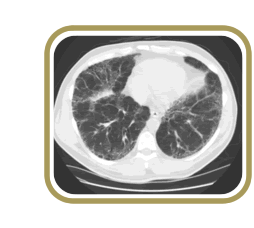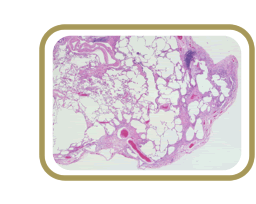Interstitial Lung Disease/ Pulmonary Fibrosis
Translational-Clinical Research
Mission Statement:
 Interstitial lung diseases are a group of inflammatory and scarring processes that affect the gas exchanging area of the lungs. Sometimes a causative factor is identified, such as disease induced by certain medications or asbestos, but other times no causative agent is identified. Our mission is to improve the lives of patients with interstitial lung disease, using the best available therapies, and to provide patients the opportunity to participate in clinical trials of novel therapies to improve care for the future.
Interstitial lung diseases are a group of inflammatory and scarring processes that affect the gas exchanging area of the lungs. Sometimes a causative factor is identified, such as disease induced by certain medications or asbestos, but other times no causative agent is identified. Our mission is to improve the lives of patients with interstitial lung disease, using the best available therapies, and to provide patients the opportunity to participate in clinical trials of novel therapies to improve care for the future.
Background:
The Boston University Pulmonary Section has a long history of clinical research in pulmonary fibrosis dating back to the description of UIP (usual interstitial pneumonia) and DIP (desquamative interstitial pneumonia) by Dr. Gaensler and colleagues in 1975 (Carrington CB, Gaensler EA, Coutu RE, et al. N Engl J Med 1978; 298:801). Subsequent work has included the description of bronchiolitis obliterans and organizing pneumonia (BOOP) (Epler GR, Colby TV, McLoud TC, Carrington CB, Gaensler EA. N Engl J. Med 1985;312:152–8) and a review of Dr. Gaensler’s experience with chronic eosinophilic pneumonia (Jederlinic PJ, Sicilian L, Gaensler EA. Chest 1985;68:665-71). The Pulmonary Center also developed an animal model of human pulmonary fibrosis that is used worldwide to test the efficacy of potential treatments and develop insights into the pathogenesis of this disorder (bleomycin induced fibrosis in rodents). In the two decades since the landmark description of UIP and DIP, interstitial lung diseases have been further sub classified: UIP, NSIP (nonspecific interstitial pneumonitis), DIP, LIP (lymphocytic interstitial pneumonitis), respiratory bronchiolitis interstitial lung disease and BOOP.
More recently, The Pulmonary Center has pursued basic science advances in pulmonary fibrosis and participated in clinical trials to identify effective treatment for idiopathic pulmonary fibrosis (IPF/UIP). These studies have included trials of interferon-beta and interferon-gamma. It is our sincere hope and expectation that such studies will eventually identify effective therapy for IPF/UIP. In addition, we are active in the diagnosis and treatment of all other types of interstitial lung disease.
Clinical Activities:
Several of the Pulmonary Center physicians have long term interest and expertise in the diagnosis and treatment of patients with interstitial lung disease, including:
- Evaluation of potential inciting factors, such as medications, collagen vascular disease, occupational or other inhalational exposures
- Pulmonary function testing
- High resolution lung CT scan
- Flexible fiberoptic bronchoscopy or video assisted lung biopsy
- Review of all of these studies to determine the type of interstitial lung disease
- Use of immunosuppressive or immunomodulatory therapy
- Innovative therapies for refractory disease
- Referral for lung transplant evaluation
Translational-Clinical Research:
 Idiopathic pulmonary fibrosis/Usual interstitial pneumonitis remains a disease of unknown etiology and without proven effective therapy. Our focus is to develop an understanding of the causes and pathogenesis at both the basic science and clinical levels in order to develop more disease- and patient-specific treatments. Until clearly effective therapies are identified, we feel it is vitally important to participate in clinical trials of promising therapies to determine whether they do indeed work and how best to utilize them. Patients or referring physicians interested in participating in our clinical trials (detailed below) are encouraged to contact us through our clinical trials office (617) 638-8694 or through the Pulmonary, Allergy and Asthma Clinic (617) 638-7480.
Idiopathic pulmonary fibrosis/Usual interstitial pneumonitis remains a disease of unknown etiology and without proven effective therapy. Our focus is to develop an understanding of the causes and pathogenesis at both the basic science and clinical levels in order to develop more disease- and patient-specific treatments. Until clearly effective therapies are identified, we feel it is vitally important to participate in clinical trials of promising therapies to determine whether they do indeed work and how best to utilize them. Patients or referring physicians interested in participating in our clinical trials (detailed below) are encouraged to contact us through our clinical trials office (617) 638-8694 or through the Pulmonary, Allergy and Asthma Clinic (617) 638-7480.
Clinical trials (completed, ongoing and future):
- Biogen: Interferon-beta in Interstitial Pulmonary Fibrosis. Completed
- Intermune: A Randomized, Double-Blind, Placebo-Controlled Phase III Study of the Safety and Efficacy of Subcutaneous Recombinant Interferon g-1b (rIFN-g 1b) in Patients with Idiopathic Pulmonary Fibrosis GIPF-001. Completed 12/02.
- Intermune: An Open-Label Study of the Safety and Efficacy of Subcutaneous Recombinant Interferon gamma-1b (IFN-g 1b) in Patients with Idiopathic Pulmonary Fibrosis (IPF) 004. Completed.
- Intermune: An Open-Label Study of the Safety and Efficacy of Subcutaneous Recombinant Interferon gamma-1b (IFN-g 1b) in Patients with Idiopathic Pulmonary Fibrosis (IPF) 006. Completed.
- Intermune: A Randomized, Double-Blind, Placebo-Controlled, Phase 3 Study of the Safety and Efficacy of Interferon gamma-1b in Patients with Idiopathic Pulmonary Fibrosis GIPF 007. Completed 2008.
- Intermune: An Open-Label Extension Study of the Safety and Efficacy of Pirfenidone in patients with Idiopathic Pulmonary Fibrosis PIPF 012. Completed 2010.
Investigators/Personnel:
- Ronald Goldstein, MD, Professor of Medicine
- Helen Hollingsworth, MD, Associate Professor of Medicine
- John Berk, MD, Associate Professor of Medicine
- Paula Goncalves, RN, Senior Clinical Research Nurse